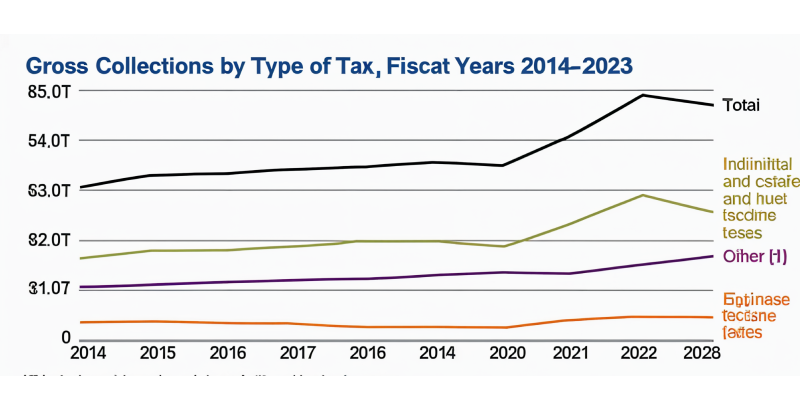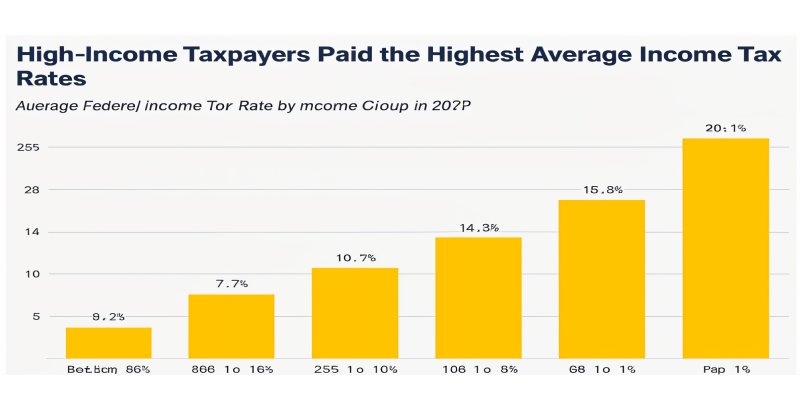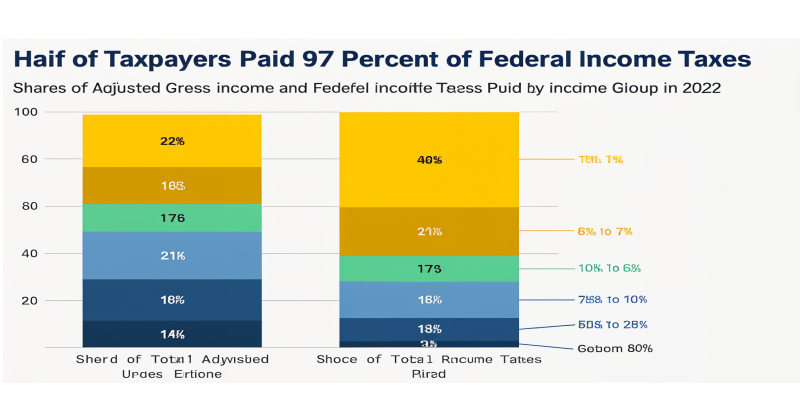
Income Tax vs Payroll Tax: Differences, Pros and Cons
Every country has their own taxation system. Understanding the income tax can be a cumbersome and confusing task. Have you ever wondered what is the difference between income tax vs payroll tax? Why is income tax different from payroll tax? If you are a business owner complying with tax regulations, criteria and calculations become challenging. It is not easy to manage federal or state taxes.
As per the latest data from the Tax Foundation, total income tax has dropped by over $57 billion to $ 2.1 trillion. There is a slow trend in income tax paid by individuals and firms. Income tax can be in the form of federal or state tax paid to the government by the individual or businesses. While payroll taxes include income taxes, other accessible taxes like Medicare, and Social Security tax.
In this informational blog, we will learn what is payroll tax, the difference between income tax and payroll tax, and more.

Gross tax collection figures. (Different tax type) Source: Internal Revenue Service (IRS)
What is Income Tax?
In simple terms, income tax is a personal tax levied by the government on individuals, businesses, and organizations on their profits and revenue generation. The income tax can be in the form of federal tax or state tax as the case may be. However, it is the responsibility of the individual or employee to file income tax returns. If you are on a payroll, then your employer calculates and pays the taxes on your behalf. (Remember, the tax and withholdings are calculated based on the information you provide in the Form W-4).
Federal and state taxes are not the same and have differential benefits. While some states do not have state tax as well. For example, Alaska & Florida do not have a state income tax. The taxes are determined from salary, rent, royalties, interest, dividends, lottery, and business earnings.
Components of Income Tax
| Tax Rates | The income tax is progressive in the United States. The higher you earn, the higher you pay the tax. The federal tax bracket is between 10 to 37%. Some states also levy their local state tax as well. |
| Taxable Income | Taxable income can include earning from salary, dividends, wages, royalties, rent, interest, and business profits. |
| Withholding | If you are on a payroll, then the employer will withhold a certain paycheck amount from the employee. (The withholding is done based on the information given in Form W4.) For example, a married person filing jointly will have less withheld as compared to filing single. This is why there is a difference between income tax vs payroll tax.
If you are a business owner or self-employed person, then you are required to file quarterly estimated tax payments. |
| Deductions & Credits | Any businesses and individuals can have deductions & credits to reduce their overall income tax liability. For example, deductions on business expenses or charitable donations. |
What is Payroll Tax?
When it comes to income tax vs payroll tax, both vary. Payroll tax includes tax on wages and salaries and also other taxes like Medicare tax, unemployment compensation, and social security tax. In the payroll tax system, both the employer and the employee need to pay these taxes. Through payroll tax, the government funds various social, health, and insurance programs.
Components of Payroll Tax
| Medicare Taxes | The total medicare tax is 2.9%. (1.45% for employers & 1.45% for employees). |
| Social Security Taxes (FICA) | The total security tax is 12.4%. (6.2% for employer and 6.2% for employee). Federal Insurance Contribution Act (FICA) is applied. |
| Income Tax Withholding (Federal) | Businesses are required to deduct federal income taxes from wages. (The amount depends on the annual income and information filed in Form W4). |
| Unemployment Taxes (FUTA) | Most employers are required to pay the Federal Unemployment Tax Act (FUTA). The FUTA requires employers to pay 6% of $ 7000 only on the first time the employee earns towards unemployment insurance programs. |
| State/Local Taxes | In some cases, employers may withhold a certain amount in state or local taxes from wages. For example, in California, employers are required to pay employment training tax. |

Average federal income tax rate by income group (2022 figures). Source: Tax Foundation
What is The Difference Between Income Tax vs Payroll Tax?
Here is a brief table comparing income tax vs payroll tax.
| Payroll Tax | Income Tax | |
| Whom is it taxed or applied to? | It applies to employees’ wages and salaries. | It applies to all income sources, including wages and salaries. |
| For what purpose? | Applicable to social security, medicare, federal unemployment, and state/local tax where required. | Applicable to a wide range of public and social programs funding. For example, education and infrastructure. |
| What are the tax rates? | The current payroll tax rate is 15.3%. (for both employers and employees). | The current federal income tax rate is between 10% and 37%. State taxes are different and vary from state to state. Do note that some states do not levy any state or local taxes. |
| Who pays the tax? | Employers and employees | Employees (but employers can withhold the amount based on information provided in Form W4) |
| Example case | Payroll tax is calculated annually based on the social security tax, FUTA, FICA, SUTA, and Medicare taxes.
For instance, a person is earning $ 50,000 per year. He is paid bi-weekly. On his paycheck withholding would be as follows: Gross Wages (per paycheck) would be $ 1923. Social security tax would be $ 119 (6% of $ 1923) Medicare tax would be $ 27.88 (1.45% of $ 1923). By summing up, the total FICA would be approximately $ 146.88. |
For instance, a person earns $ 50000 per year. And is a single tax filer. As per IRS, he stands in the 22% tax bracket but he will not be paying the 22% tax rate.
It will be calculated as follows: 10% will be taxed for the first $ 11000. 12% will be taxed over $ 11,000. 22% will be taxed over $ 44725. By summing up, the total payable federal income tax would be approximately $ 8140.50. |

Adjusted gross income and federal taxes paid figures. (2022) Source: IRS & Tax Foundation
Income Tax vs Payroll Tax: Management Challenges
Managing federal or state taxes can be problematic and challenging. There are tax hosting service providers that ensure smooth and reliable tax filings. Here are some of the major tax management challenges:
- One of the major challenges of managing taxes is complying with multiple tax regulations, orders, and conditions. Many tax acts like FUTA and FICA need to be applied when filing the returns. Income and payroll tax are both included.
- Ensuring accurate and updated recordkeeping is crucial. Not everyone can master the recordkeeping game. For example, it is necessary to keep information from employee tax forms W4, W2, and 1099s.
- The rise in remote teams has made managing tax fundamentals a challenge.
Confused about Income Tax vs. Payroll Tax? Talk to our experts now!
Conclusion
When comprehending Income tax vs payroll tax, both are different and have their criteria that are applied while filing returns. For example, income tax is levied on all sources of income while payroll tax is levied on employees’ wages and salaries only. Payroll tax rate is 15.3% while the federal income tax rate is between 10 to 37%. The payroll tax is paid by both employers and employees while income tax is mainly paid by employees, but employers withhold the amount using Form W4. In this blog, we have briefly given the differences between income tax and payroll tax. For more on similar topics, do keep reading our blogs regularly.
FAQs (Frequently Asked Questions)
What is the difference between payroll taxes and income tax?
Payroll taxes apply to wages and salaries while income tax applies to all sources of income. Payroll tax is 15.3% while income tax is 10 to 37%. Payroll tax applies to employees and employers while income tax applies to mainly employees. Income tax vs payroll tax differ in certain ways.
Who pays income taxes?
Employees, but employers can withhold a certain amount after gathering information from Form W4.
Who actually pays payroll taxes?
Payroll taxes are paid by both employers and employees. It is generally paid by those people who are under the payroll system of a company or organization.
Is income tax paid the same as the withheld?
No, it is not the same. The employer withholds a certain amount from the paycheck of employees and pays it to the government.
 written by
written byAbout Author






